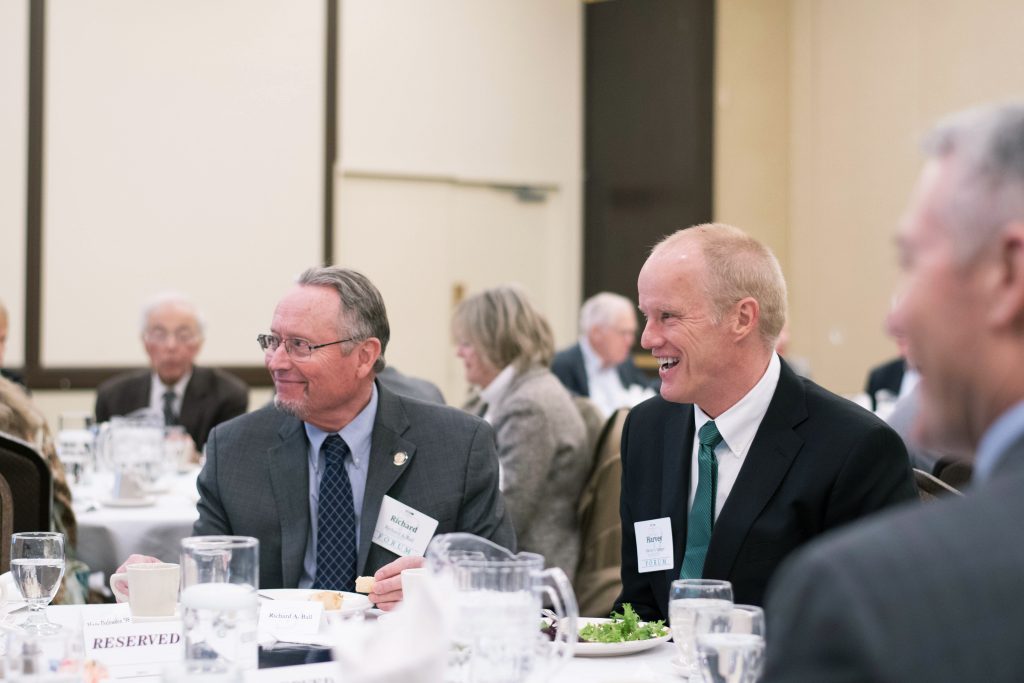Agriculture, food systems and economics were hot topics at the Binghamton University Forum’s luncheon at the DoubleTree by Hilton Hotel in Downtown Binghamton on Tuesday afternoon.
The luncheon, which featured a talk from Richard Ball, commissioner of the New York State Department of Agriculture and Markets, specifically focused on New York’s agricultural priorities for 2019 and the opportunities in New York’s farming and food industries. Luncheon discussions are hosted regularly by the Forum, an organization developed by the BU Foundation that aims to promote University and community relations and private support of BU. Past speakers include former Secretary of State Henry Kissinger and columnist Amy Dickinson, known for her “Ask Amy” column.
Ball, who also serves as secretary-treasurer of the National Association of State Department of Agriculture (NASDA) Board of Directors and president of Food Export Northeast, began his talk by discussing his concerns regarding the future of trade and labor. According to Ball, 48 percent of New York’s dairy products are exported to Mexico and Canada, but this relationship may be in danger, as Mexico has threatened to impose tariffs on American imports in response to American tariffs recently imposed on steel and aluminum. Additionally, Ball said a shortage of labor has become the biggest challenge in the agriculture and food industries.
But despite his concerns, Ball highlighted several programs that benefit the state’s food industry, such as “New York Thursdays,” a program where New York City school cafeterias feature exclusively New York-grown food once per week. He also discussed “New York State Grown & Certified,” a program that creates a seal for produce and aims to hold New York-grown produce to a higher standard than national regulations.
According to Ball, these programs aim to lead New York residents and nonresidents to be more aware of where their food is coming from, and will raise awareness about career opportunities in the agriculture and food industries. Ball, a farmer himself, said that he noticed a change in customers in recent years.
“People didn’t care so much where the food came from as long as they could get a bag of carrots for 39 cents a pound,” Ball said. “I saw a big change in my customers where they said ‘You know, it seems that my grandparents lived in a simpler time and I want to get back to that connection to agriculture.’ They were two or three generations removed from agriculture, but they wanted to get back to the basics of food and how things are grown.”
Ball also highlighted New York’s focus on hemp production. The state currently has about 3,500 acres of hemp and is one of the top industrial hemp growers in the nation.
During Ball’s Q&A, attendees asked him a variety of questions related to agriculture and the environment, including his thoughts on “Meatless Mondays,” an initiative in New York City schools that cuts out meat in cafeterias every Monday. Ball said he believes the thinking behind “Meatless Mondays” was misguided.
“I’m not sure how they could blame [pollution] on some cows in upstate New York,” Ball said.
According to Ball, farming does not just start and end with agriculture, because farmers’ work also enables other industries.
“Farmers only represent about 1 percent of the population,” Ball said. “But every job on a farm represents seven or eight more jobs off the farm. It might be transportation, it might be logistics, it might be in food safety, it might be in blockchain technology, it might be in preparing GPS-driven tractors or drones, so I think that’s just going to grow because the technology in agriculture is at an apex right now.”



